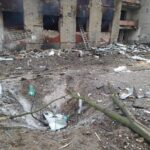Qatar has temporarily closed its airspace following advisories from the United States and the United Kingdom urging their citizens in the Gulf nation to remain indoors “until further notice.”
The U.S. Embassy in Qatar issued an online alert advising Americans to shelter in place “out of an abundance of caution.” The British government, in turn, echoed the warning, citing the U.S. advisory as the basis for its own.
These warnings come in the wake of heightened tensions after the United States launched strikes on three nuclear facilities in Iran on Saturday. The U.S. State Department subsequently urged Americans worldwide to “exercise increased caution.” In response, Iran has threatened to retaliate, further escalating fears in the region.
In an official statement, Qatar’s Ministry of Foreign Affairs said that the airspace closure was implemented to protect the safety of the country’s residents and visitors. However, the ministry clarified in a follow-up statement that the embassy warnings “do not necessarily reflect the existence of specific threats.”
“The security situation in the country is stable,” the ministry said. It added that “relevant authorities are actively monitoring the situation and are fully prepared to take all necessary steps to ensure the safety of citizens, residents, and visitors.”
Qatar hosts the Al Udeid Air Base, the largest U.S. military installation in the Middle East. The base serves as a critical hub for U.S. operations in the region and houses approximately 8,000 American citizens, according to the U.S. State Department.
Currently, the United States maintains around 40,000 troops across the Middle East.
Air traffic monitoring websites showed several flights diverting to alternate destinations as Qatari airspace was shut down. According to data from Flightradar24, there were at least 100 flights en route to Doha. Hamad International Airport, one of the Middle East’s major transit hubs, has been significantly impacted.
Following the U.S. Embassy’s alert, several other organizations in Qatar issued their own warnings. Multiple universities in the country advised students to remain indoors or return home until further notice.
Despite the rising regional uncertainty, the U.S. State Department continues to describe its bilateral ties with Qatar as “strong.” Washington credits Doha with playing a pivotal financial, political, and military role in addressing instability in the region.






